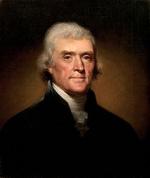|
This section contains 368 words (approx. 2 pages at 300 words per page) |

|
John Locke was an English philosopher who emphasized the importance of experience of the senses in pursuit of knowledge rather than instinctive speculation or deduction. This philosophy is called empiricism (from the word "empirical," meaning based on observation or experience). Locke's doctrine was expressed in Essay Concerning Human Understanding (1690). He regarded the mind of a person at birth as a tabula rasa (a blank slate) upon which experience created and stored knowledge, just as a person can write facts on a chalkboard (or today, more likely, store information in a computer). Locke held that all persons are born good, independent, and equal.
In his Two Treatises of Government (1690), Locke attacked the theory of divine right of kings. He argued that sovereignty (supreme authority) resided with the people. He further stated that the state is bound by civil law (law decided on by citizens of a country...
|
This section contains 368 words (approx. 2 pages at 300 words per page) |

|




